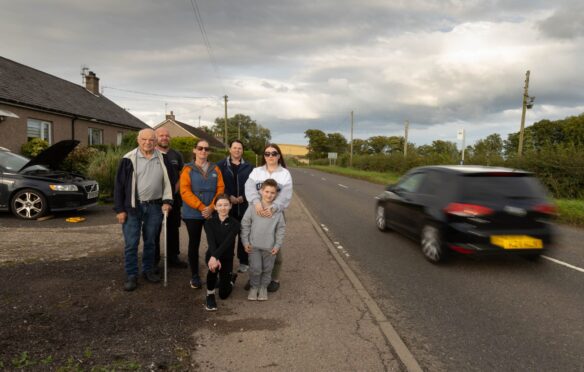Angus care chiefs say no other “near misses” have been uncovered following the death of a cancer victim left to die in squalor.
A review of almost 100 local cases was launched in the wake of the tragedy surrounding a patient known as P19.
The 50-year-old died in December 2018 from advanced bowel cancer.
But a catalogue of failings led to the death becoming the subject of a significant case review (SCR).
A damning report released last November said P19 had been failed by nearly 20 different services and organisations.
It found the patient had died “without dignity”.
And while the death could not have been prevented, P19 was left to live in “squalid” and “horrendous” conditions.
Angus Adult Protection Committee, Angus Health and Social Care Partnership (AHSCP) and NHS Tayside all apologised publicly over the failings.
And the review led to almost 60 improvement recommendations.
“I am heart sorry for everyone involved in this – P19 and the people involved in the services.”
Angus councillor Julie Bell
An assurance has now been given that a major audit found no evidence of others in Angus at risk of slipping through the net.
Joint commission
Council chief executive Margo Williamson told scrutiny committee councillors: “A full multi-agency action plan is being developed to ensure all 59 recommendations are progressed.”
A number of changes have already been put in place.
And a commission involving Healthcare Improvement Scotland (HIS) and the Care Inspectorate (CI) will be in place within weeks.
Its aim is to ensure lessons learned from the tragic case are applied in Angus and beyond.
“A commission instructed to support a local area to deliver an improvement plan from an SCR is an indication of the significance of the findings both locally and nationally,” said the chief executive.
“And the scale of work that is required to deliver the recommendations in a meaningful way.”
‘Incredibly complex’
Kirriemuir councillor Julie Bell said: “I am heart sorry for everyone involved in this – P19 and the people involved in the services.”
The SCR found some of those involved in P19’s care had suffered mental trauma.
“There is a real tension between capacity, human rights, risk management, decision-making and rules,” she added.
“It’s incredibly complex.
“And I hate the phrase, but I wonder if any other instances of close calls or near misses have been picked up?”
AHSCP head of service George Bowie said a large-scale audit of adult protection care management was carried out in 2020.
“It was 96 cases, so it was a big audit. We didn’t identify any high-risk situations.”
Commissioned service providers have also been looked at, with no evidence of major risk cases.
“That’s not to say there are not risks or challenges in these arrangements,” Mr Bowie said.
“Of course there are. And they are very pressured at the moment because of capacity issues.”
Meetings are being held on a weekly basis to prioritise Angus cases on the basis of need and risk.
And the authority remains in close contact with the Scottish Government around progress on the review recommendations.
Council actions
Among those were three specific to Angus Council.
- Contracts with care providers should include explicit information on how to escalate concerns and who those should be raised with.
- Regular inspection of properties where concerns have been raised on a regular basis.
- A system to make clear roles and responsibilities for vulnerable people requiring temporary housing.
Poor record-keeping, missed opportunities and blurred lines of responsibility were all criticised in the catalogue of failings around P19’s care.
There were 19 different agencies and organisations involved in the case.
P19 was diagnosed with multiple sclerosis in 2014 and had used alcohol heavily in the past.
Yet despite being considered an “adult at risk” in August 2018, they died in an “emaciated” state, weighing just over six-and-a-half stones










